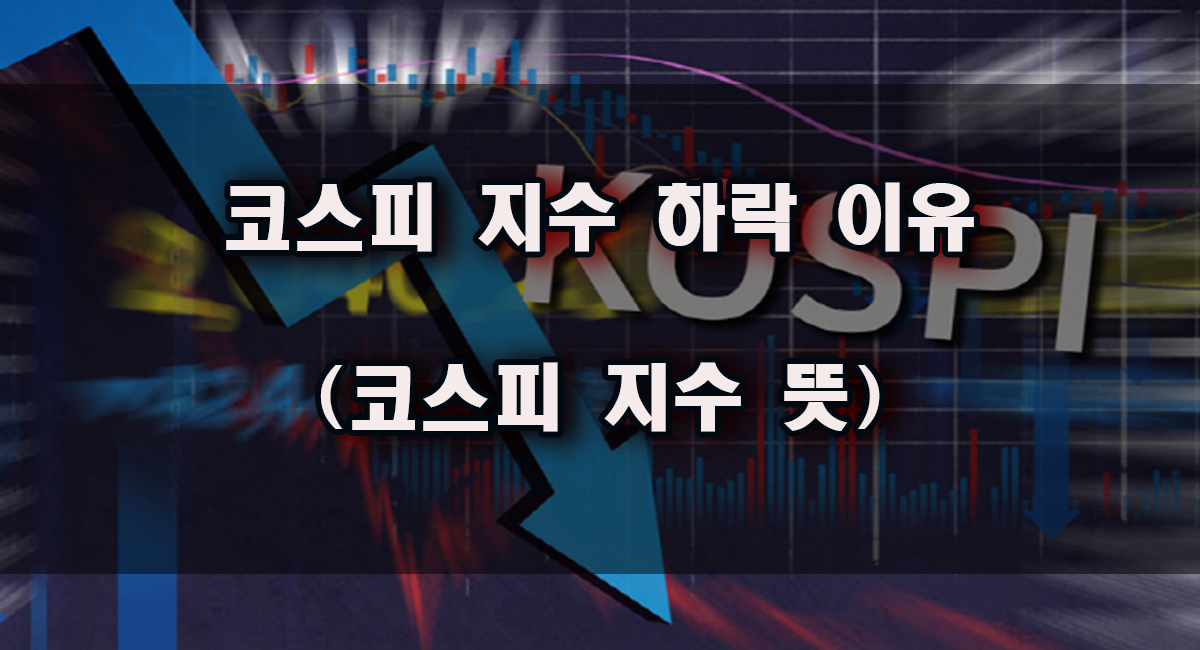목차
- 서론
- 코스피지수
- 코스피지수 하락 이유
- 3-1. 미국 금리 인하 기대감 후퇴
- 3-2. 지정학적 위험
- 3-3. 외국인 매도 공세
- 결론
서론

현재 국내 증시가 연일 하락세를 보이고있습니다. 이번 포스팅에서는 코스피지수가 무엇을 의미하고 현재 코스피지수 하락 이유 에 대해서 알아보도록 하겠습니다.
코스피지수?
코스피지수란 증권거래소에 상장된 상장기업의 주식 변동을 시가총액의 기준시점과 비교시점을 비교하여 작성한 지표로, 코스피 시장에 상장된 전 종목을 대상으로 산출됩니다. 원래 명칭은 종합주가지수였으나, 2005년 11월 1일부터 코스피 지수라 불리우며 사용되고 있습니다.
코스피지수의 기준시점은 1980년 1월 4일 시가총액 입니다. 산출방식은 다음과 같습니다.
*코스피지수 = 
코스피 지수는 대한민국의 현재 증권시장의 상황 과 경제상황을 나타냅니다. 코스피 지수가 높다는 것은 기업들의 실적과 활동이 활발하여 주가가 오르고 있으며 그로인해 국내 경제 역시 활발하게 잘 돌아가고 있다는 뜻입니다. 반대로 코스피 지수의 하락은 기업들의 실적과 활동이 좋지 않으며 세계 경제의 이슈나 국내 경제의 이슈로 인한 부정적인 경제 활동을 의미합니다.
코스피지수는 글로벌 경제 활동에도 많은 영향을 받습니다. 특히 미국 경제가 휘청거리면 코스피 지수 역시 쉽게 흔들리는 것을 확인하실 수 있습니다. 세계 경제의 금리나 전쟁,자연재해 등과 같은 영향에도 코스피 지수는 오르락 내리락 합니다.
3.코스피지수 하락 이유
2024년 새해에 들어서면서 코스피지수 가 연일 하락하고 있습니다. 흔히 말하는 ‘1월 효과’라는 말이 무색할 정도로 연초부터 국내 증시가 가파르게 하락세를 나타내고 있습니다. 17일 코스피지수 는 전일 대비 61.69포인트(2.47%) 내린 2435,90으로 마감했습니다. 이날 종가는 지난해 11월 14일 이후 두 달 여만에 최저치입니다. 올해 들어 코스피 지수는 첫 거래일(2일) 상승한 후 8거래일(3~12일) 연속 하락했습니다. 15일 강보합으로 하락세가 잠시 멈췄지만 다시 이틀 연속 하락하며 2500선이 무너진데 이어 2400선도 안심할 수 없게 됐습니다. 올해만 들어 하락율이 8%에 이릅니다.
18일 현재(오전 10시 55분)기준 코스피지수는 전날대비 12.97p (0.53%) 오른 2,448.87를 가리키고 있습니다.
그렇다면 코스피지수가 연일 하락하는 이유가 무엇일까요? 확인해보도록 하겠습니다.
3-1. 미국 금리 인하 기대감 후퇴

지난해 연준(Fed)이 2024년 금리 인하 계획을 발표해 세계 증시가 상승했지만 16일 연준 이사가 금리 인하를 서두르지 않을 것이라고 발언함에 다라 조기 금리 인하 기대감이 크게 꺾이며 글로벌 증시가 일제히 하락했습니다. 글로벌 증시가 하락하면서 코스피지수 역시 하락했습니다.
3-2. 지정학적 위험

최근 러시아와 우크라이나의 전쟁 뿐만 아니라 세계 주요 무역 항로인 홍해-수에즈 운하에서 예멘 후티 반군이 글로벌 상선 및 유조선에 대한 공격을 감행하면서 우리나라의 지정학적 위험도가 높아지고 있습니다. 최근 북한이 우리나라를 주적으로 헌법에 표기했으며, 그동안 소통채널로 여겨지던 주요 기구를 폐지하고 극초음속 미사일을 시험 발사하는 등 도발 수위를 점차 높이며 대북 리스크가 확산됐습니다. 이런 행위가 국내 증시에도 악재로 분류되며 많은 부정적인 영향을 끼치는 것으로 전문가들은 설명했습니다.
3-3. 외국인 매도 공세

외국인 투자자들이나 글로벌 기관들이 한국 시장에서 자금을 인출하면서 코스피지수가 하락할 수 있습니다. 글로벌적인 위험 요인이나 외환 시장 변동 등으로 인해 외국 투자자들이 한국 시장에 대한 신뢰를 잃으면서 자금 유출이 발생하게 됩니다. 외국 투자자들의 인출이 코스피지수에 영향을 끼치는 대표적인 사례로 글로벌경제 불안과 환율 변동, 국제적 이벤트 등이 있습니다.
위에서 언급한 것처럼 조기 금리 인하의 기대감 상실과 국제적 이슈의 여파로 인한 지정학적 리스크까지 겹치며 외국인 투자자들이 연이은 매도 공세를 보이고있어 코스피지수가 하락하고 있습니다.
결론
코스피지수는 대한민국의 기업들이 현재 어떤가를 잘 나타내는 지표이며 국내 경제와 증시를 한눈에 알 수 있는 지표입니다. 코스피 지수는 수많은 외부적,내부적 요인에 의해 영향을 받습니다. 글로벌 경제 뿐만 아니라 각 종 이슈들로 인해 변동이 생깁니다. 2024년도 초기인 현재 코스피 지수는 연일 하락하고 있습니다. 그만큼 국내 증시가 많이 불안한 상태입니다. 하지만 대부분의 경제 전문가들은 미국의 나스닥지수에 비해 코스피지수가 많이 저평가 됐다고 설명하고있습니다. 2024년에 코스피지수가 얼마나 반등할 수 있을지가 핵심 논제입니다.

Table of Contents
- 1 .Introduction
- 2. KOSPI Index
- 3. Reasons for the Decline in KOSPI Index
- 3-1. Retreat of Expectations for U.S. Interest Rate Cut
- 3-2. Geopolitical Risks
- 3-3. Foreign Selling Pressure
- 4. Conclusion
Currently, the domestic stock market is showing a continuous downward trend. In this post, we will explore what the KOSPI Index represents and delve into the reasons behind the current decline in the KOSPI Index.
KOSPI Index
The KOSPI Index is an indicator calculated by comparing the fluctuations in the stock prices of listed companies on the Korea Exchange (KRX) at the reference point and the comparison point based on market capitalization. Originally known as the Composite Stock Price Index, it has been referred to as the KOSPI Index since November 1, 2005.
The base date for the KOSPI Index is January 4, 1980, and the calculation method is as follows:
The KOSPI Index reflects the current situation of the securities market and the economic conditions in South Korea. A high KOSPI Index implies active performance and activities of companies, leading to rising stock prices and indicating a vibrant domestic economy. Conversely, a decline in the KOSPI Index suggests poor performance and activities of companies, along with negative economic activities due to global or domestic issues.
The KOSPI Index is also influenced by global economic activities. Particularly, when the U.S. economy experiences turbulence, the KOSPI Index tends to be easily affected. The index fluctuates in response to global events such as interest rates, wars, natural disasters, and other factors.
- Reasons for the Decline in KOSPI Index
Since the beginning of the new year in 2024, the KOSPI Index has been consistently declining. The so-called ‘January Effect’ is proving to be inconsequential as the domestic stock market is showing a steep downward trend from the early days of the year.
On the 17th, the KOSPI Index closed at 2,435.90, down 61.69 points (2.47%) from the previous day, reaching its lowest point in over two months since November 14 of the previous year. In the new year, the KOSPI Index rose on the first trading day (2nd) but then experienced eight consecutive days of decline (3rd to 12th).
Although there was a brief stabilization on the 15th, the index resumed its decline for two consecutive days, breaking the 2,500 level, and concerns are rising as it approaches the 2,400 level. The decline in the index this year alone has reached 8%.
As of the 18th (10:55 AM), the KOSPI Index stands at 2,448.87, showing a 12.97 points (0.53%) increase from the previous day.
So, what are the reasons behind the continuous decline in the KOSPI Index? Let’s investigate.
3-1. Retreat of Expectations for U.S. Interest Rate Cut
Last year, the Federal Reserve (Fed) announced plans for an interest rate cut in 2024, leading to a global stock market surge. However, on the 16th, a Fed director’s statement that there would be no rush for an interest rate cut significantly dampened expectations for an early rate cut, causing a sharp decline in global stock markets. As global markets declined, the KOSPI Index also experienced a downturn.
3-2. Geopolitical Risks
Recent conflicts between Russia and Ukraine, as well as attacks by Houthi rebels in the crucial global trade routes of the Hong Kong-Suez Canal, have increased geopolitical risks for South Korea. North Korea has recently labeled South Korea as an enemy in its constitution, dissolved key communication channels, and conducted tests of hypersonic missiles, escalating the risk of North Korea posing a threat. Experts explain that such actions are classified as negative factors affecting the domestic stock market.
3-3. Foreign Selling Pressure
Foreign investors or global institutions withdrawing funds from the Korean market can lead to a decline in the KOSPI Index. If foreign investors lose confidence in the Korean market due to global risks or fluctuations in the foreign exchange market, capital outflows can occur. Representative examples of factors influencing the KOSPI Index due to foreign investors’ withdrawals include global economic uncertainties, exchange rate fluctuations, and international events.
As mentioned above, the loss of expectations for an early interest rate cut, combined with the repercussions of international issues such as geopolitical risks, has led to a succession of foreign selling pressure, causing the decline in the KOSPI Index.
Conclusion
The KOSPI Index is an indicator that well represents the current state of South Korean companies and provides insights into the domestic economy and stock market. The KOSPI Index is influenced by numerous external and internal factors, not only from the global economy but also from various issues. As of the early days of 2024, the KOSPI Index is continuously declining, indicating a state of considerable unease in the domestic stock market. However, most economic experts explain that the KOSPI Index is undervalued compared to the NASDAQ Index in the United States. The key question remains: how much can the KOSPI Index rebound in 2024?



